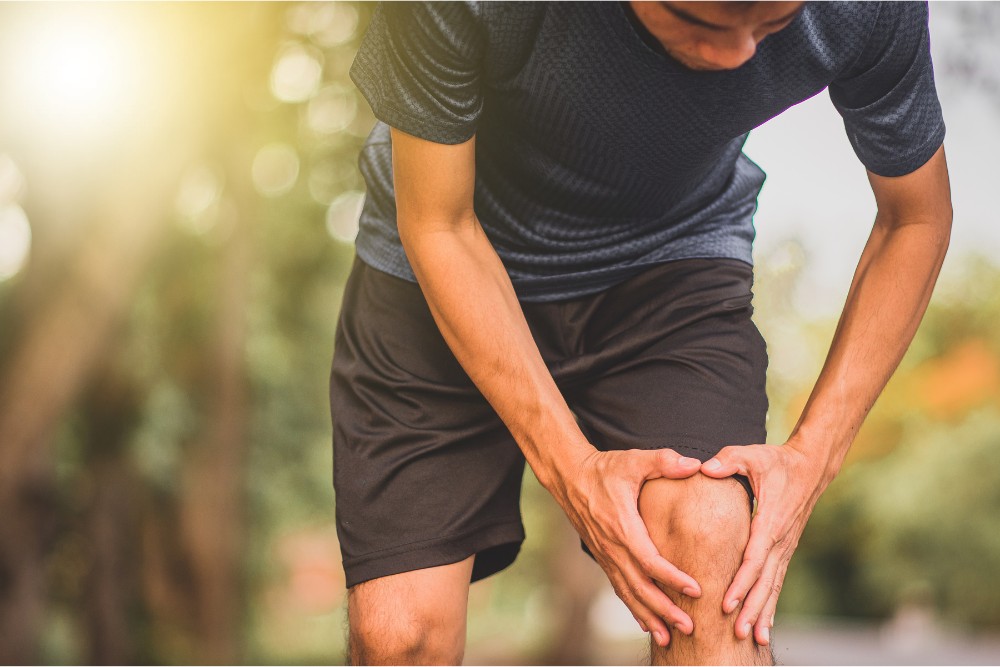The knee is a complex structure comprised of bones and ligaments that work perfectly together. Unfortunately, an injury or medical condition can disrupt the delicate balance, altering how everything works. If your knee buckles when walking, this could indicate something is wrong. A visit to your doctor will determine the cause and how to treat the issue for better mobility.
The most common treatments for knee buckling issues are physical therapy and other exercises. The treatment rebuilds muscle strength, improves range of motion, and increases stability. You may also require medication or surgery, depending on the damage. For more information on possible causes and how to regain knee function, keep reading.

Why Does My Knee Buckle When Walking?
Knee buckling, or the sensation of your knee giving out while walking, can be caused by various underlying conditions. It’s important to identify the root cause to address the issue effectively.
Arthritis could also cause your knee to buckle when walking, climbing stairs, or standing. Osteoarthritis is most common and occurs when the cartilage wears away slowly. Rheumatoid arthritis is an autoimmune condition causing the synovial membrane over the knee to swell. Bone damage from an injury could also cause posttraumatic arthritis, resulting in excess wear and instability.
Another possible condition related to knee issues is multiple sclerosis or other neurological conditions, such stroke. As an inflammatory condition affecting the central nervous system, it impairs movement and gait. The symptoms include muscle weakness and reduced coordination, especially in the knees and legs. Though treatment may help slow the progression, there is no cure for MS.
The protective membrane in the knee contains four folds called plica. Irritation in one of these plica syndrome, causing knee buckling when walking, pain, and swelling. The condition often results from trauma, including vehicle accidents and falls. Running and biking could also cause plica syndrome, requiring treatment to manage the symptoms.
Knee injuries often result in instability and buckling when moving around. The most frequent issues include ligament damage or meniscus tears. These frequently occur when playing sports, running, jumping, or after a fall. As well as your knee giving way, you may feel pain, stiffness, swelling, and reduced range of motion.
Nerve issues also cause this issue. Conditions like peripheral neuropathy or sciatica can impair nerve signals to the muscles controlling the knee.
How do I get my knee to stop buckling?
Treating knee problems often depends on the condition causing the issue. Though they frequently require differing options, one common treatment is physical therapy. It offers several benefits, regardless of why your knees buckle when walking.
Physical therapy is customizable to match the condition causing your knee problems. It includes exercises to strengthen the muscles around the knee for better support. Those activities also improve range of motion and balance for better mobility.
Even if you don’t need physical therapy, stretches and exercises usually benefit unstable knees. You can tailor them to increase muscle strength and improve flexibility for a longer stride. Discuss new exercises with your doctor to ensure they don’t cause further damage.
Maintaining a healthy weight also helps decrease knee buckling when walking. Experts state that 1.5 times your body weight rests on your knees when walking. The excess strain doubles or triples on an incline, causing further damage to the joints. Exercise and a healthy diet can help you shed those extra pounds and improve knee functions.
It is crucial to know the cause. Do consult your doctor to find out what exactly is causing this to avoid falls and injuries during walks or other physical activities.
Resources:
- UMMS, Weak in the Knees: Causes and Solutions for Knee Buckling
https://health.umms.org/2023/06/30/knee-buckling/#:~:text=Knee%20buckling%20is%20often%20attributed,acting%20like%20a%20circuit%20breaker - OrthoInfo, Arthritis of the Knee,
https://orthoinfo.aaos.org/en/diseases–conditions/arthritis-of-the-knee - PubMed Central, March 31, 2015, Knee muscle strength in multiple sclerosis: relationship with gait characteristics
https://pmc.ncbi.nlm.nih.gov/articles/PMC4395720/ - Cleveland Clinic, Plica Syndrome
https://my.clevelandclinic.org/health/diseases/21705-plica-syndrome - Mayo Clinic, Knee pain
https://www.mayoclinic.org/diseases-conditions/knee-pain/diagnosis-treatment/drc-20350855 - HSS, Stretches and Exercises to Strengthen Your Knees, from a PT
https://www.hss.edu/article_exercises-strengthen-knees.asp - Harvard Health Publishing, December 11, 2019, Why weight matters when it comes to joint pain
https://www.health.harvard.edu/pain/why-weight-matters-when-it-comes-to-joint-pain
This content comprises informative and educational resources only and can not be considered as a substitute for professional health or medical guidance. Reliance on any information provided in this article is solely at your own risk. If you have any inquiries or apprehensions about your medical condition or health goals, talk with a licensed physician or healthcare provider.






Leave A Comment